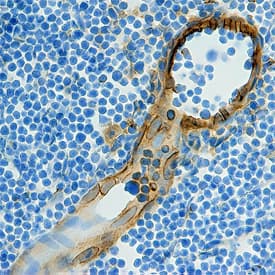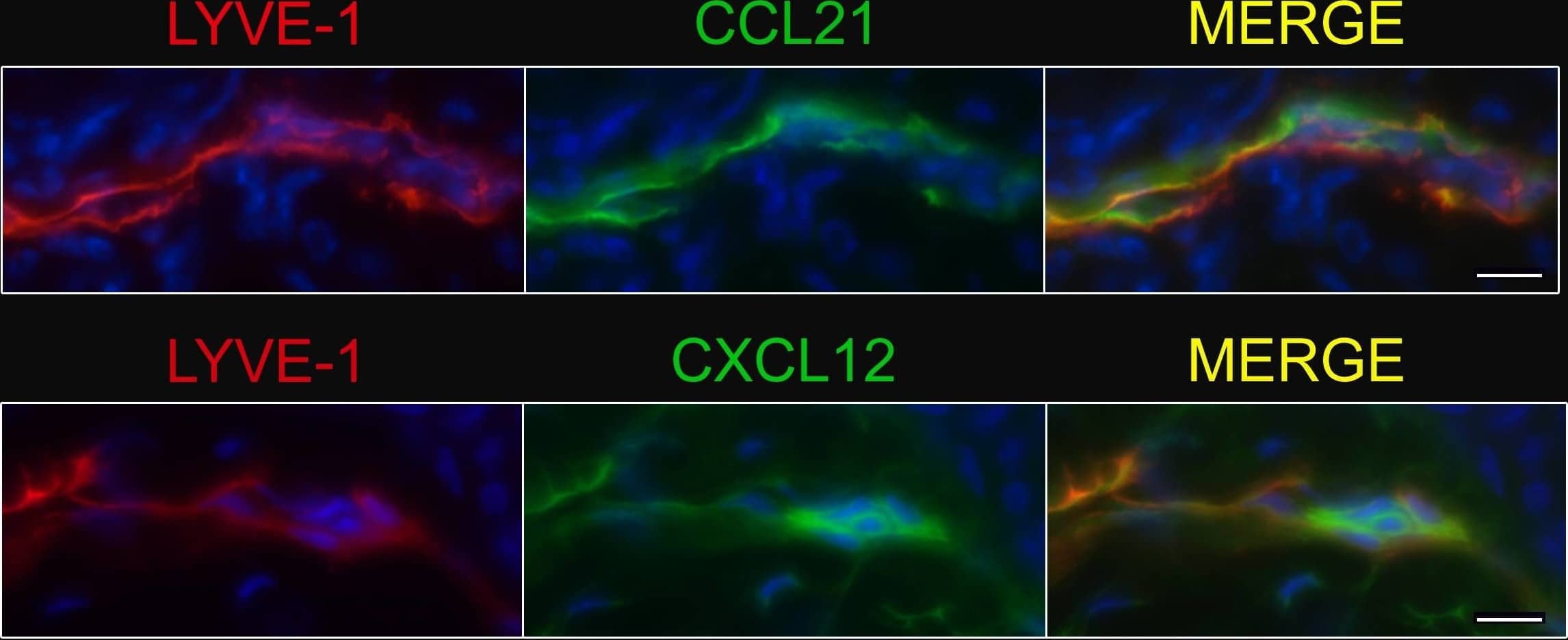Mouse CCL21/6Ckine Antibody Best Seller
R&D Systems, part of Bio-Techne | Catalog # AF457


Key Product Details
Species Reactivity
Validated:
Cited:
Applications
Validated:
Cited:
Label
Antibody Source
Product Specifications
Immunogen
Ser24-Gly133
Accession # P84444
Specificity
Clonality
Host
Isotype
Endotoxin Level
Scientific Data Images for Mouse CCL21/6Ckine Antibody
Chemotaxis Induced by CCL21/6Ckine and Neutralization by Mouse CCL21/6Ckine Antibody.
Recombinant Mouse CCL21/6Ckine (Catalog # 457-6C) chemoattracts the BaF3 mouse pro-B cell line transfected with human CCR7 in a dose-dependent manner (orange line). The amount of cells that migrated through to the lower chemotaxis chamber was measured by Resazurin (Catalog # AR002). Chemotaxis elicited by Recombinant Mouse CCL21/6Ckine (50 ng/mL) is neutralized (green line) by increasing concentrations of Goat Anti-Mouse CCL21/6Ckine Antigen Affinity-purified Polyclonal Antibody (Catalog # AF457). The ND50 is typically 0.5-2.5 µg/mL.CCL21/6Ckine in Mouse Thymus.
CCL21/6Ckine was detected in perfusion fixed frozen sections of mouse thymus using Goat Anti-Mouse CCL21/6Ckine Antigen Affinity-purified Polyclonal Antibody (Catalog # AF457) at 5 µg/mL overnight at 4 °C. Tissue was stained using the Anti-Goat HRP-DAB Cell & Tissue Staining Kit (brown; Catalog # CTS008) and counterstained with hematoxylin (blue). Specific staining was localized to endothelial cells. View our protocol for Chromogenic IHC Staining of Frozen Tissue Sections.Detection of CCL21/6Ckine in D3 Mouse Cell Line by Flow Cytometry.
D3 mouse embryonic stem cell line was stained with Goat Anti-Mouse CCL21/6Ckine Antigen Affinity-purified Polyclonal Antibody (Catalog # AF457, filled histogram) or control antibody (Catalog # AB-108-C, open histogram), followed by Phycoerythrin-conjugated Anti-Goat IgG Secondary Antibody (Catalog # F0107). To facilitate intracellular staining, cells were fixed with paraformaldehyde and permeabilized with saponin.Applications for Mouse CCL21/6Ckine Antibody
CyTOF-ready
Immunohistochemistry
Sample: Perfusion fixed frozen sections of mouse thymus
Intracellular Staining by Flow Cytometry
Sample: D3 mouse embryonic stem cell line fixed with paraformaldehyde and permeabilized with saponin.
Western Blot
Sample: Recombinant Mouse CCL21/6Ckine (Catalog # 457-6C)
Neutralization
Reviewed Applications
Read 3 reviews rated 4.7 using AF457 in the following applications:
Formulation, Preparation, and Storage
Purification
Reconstitution
Formulation
Shipping
Stability & Storage
- 12 months from date of receipt, -20 to -70 °C as supplied.
- 1 month, 2 to 8 °C under sterile conditions after reconstitution.
- 6 months, -20 to -70 °C under sterile conditions after reconstitution.
Background: CCL21/6Ckine
6Ckine is a novel CC chemokine discovered independently by three groups from the EST database. 6Ckine, also named SLC (secondary lymphoid-tissue chemokine), CCL21 and Exodus-2, shows 21-33% identity to other CC chemokines. 6Ckine contains the four conserved cysteines characteristic of beta chemokines plus two additional cysteines in its unusually long carboxyl-terminal domain. Human 6Ckine cDNA encodes a 134 amino acid residue, highly basic, precursor protein with a 23 amino acid residue signal peptide that is cleaved to form the predicted 111 amino acid residue mature protein. Mouse 6Ckine cDNA encodes a 133 amino acid residue protein with a 23 residue signal peptide that is cleaved to generate the 110 residue mature protein. Human and mouse 6Ckine are highly conserved, exhibiting 86% amino acid sequence identity. 6Ckine is constitutively expressed at high levels in lymphoid tissues such as lymph nodes, spleen and appendix. In mouse, high levels of 6Ckine mRNA are also detected in the lung. The gene for human 6Ckine has been localized at human chromosome 9p13 rather than chromosome 17 where the genes of many human CC chemokines are clustered. The 6Ckine gene location is within a region of about 100 kb from the MIP-3 beta/ELC gene, another identified novel CC chemokine. Unlike most CC chemokines, 6Ckine is not chemotactic for monocytes. 6Ckine has also been reported to inhibit hemopoietic progenitor colony formation in a dose-dependent manner. 6Ckine acts via a class of as yet unidentified CC receptors on both T cells and B cells that are not shared by any other CC chemokines. Mature rat CCL21 shares 84% aa sequence identity with mouse CCL21.
Alternate Names
Gene Symbol
UniProt
Additional CCL21/6Ckine Products
Product Documents for Mouse CCL21/6Ckine Antibody
Product Specific Notices for Mouse CCL21/6Ckine Antibody
For research use only


